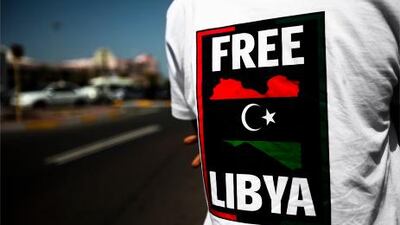ABU DHABI // As an uprising gripped their home country, Libyans in the UAE yesterday turned to their ambassador for reassurance about their loved ones.
Dozens of protesters gathered before 11am outside the embassy and called for the removal of the Libyan flag, which they viewed as a symbol of Muammar Qaddafi’s reign.
“This is a symbol of Qaddafi’s rule,” said one demonstrator, Amal Rahuma. “Have some respect. Let us in. It is our embassy.”
The protesters also wanted clarity from their country’s representative on where he stood as the unrest in Libya continued.
But when the ambassador, Omar al Ghanai, finally emerged to deliver a statement just after noon, they said what they heard did not bring them peace of mind.
Speaking in the embassy’s car park near Khaleej al Arabi street, Mr Ghanai told the Libyans who crowded the gates that he would lower the flag to half-mast in honour of those killed in the uprisings.
At least 640 people have been killed in protests, the International Federation for Human Rights said yesterday, Agence France-Presse reported. The figure is more than double the official Libyan government toll of 300 dead.
Although Mr Ghanai told them he stood with the people and condemned the “excessive use of force against the people of Libya”, he had not resigned and would not remove the flag.
“We are with every single tribe in Libya. We pray for them and pray for their mercy,” he said. “This Libyan [embassy] is a place for all Libyans here. It protects, takes care of them in every way. Anything they need, any time they need.”
One female protester burst into tears during the brief address. Mansoor, an engineering student, who did not give his last name, said he had been unable to reach his family in Benghazi for the past three days.
He said he was desperate to meet the ambassador before considering his next move, which would be a trip back home, crossing in through Egypt.
“I spend five to six hours trying to make a single call,” said Mansoor, who has studied here for two years. “Now I am told they have even cut off electricity.”
Abdul Fattah Hassan echoed those sentiments, saying sporadic contact had caused him to turn to the embassy for help.
“We don’t want [the ambassador] to resign. We want him to identify his stand,” he said. “We just want to know whether he is with the people. When we reach our families, our friends on the telephone, we don’t ask about our tribe or that tribe. We are one family, we are all interlinked. We ask about people around them, then we spread the news if they are OK.”
After the speech, the demonstrators walked off in groups, some expressing frustration, while others said their hopes were dashed.
“If he is with us, then he should resign,” said Suleiman, a Web design student who declined to give his surname. “What this means to us is that he is still part of the regime.”
Younis Beshari, 23, from Benghazi, said he wanted to return to Libya to join the protests. “I feel ashamed sitting in front of the TV, watching this. I want to be with my friends,” he said.
He arrived in the UAE 10 days before protests broke out in Libya. He said he had spent the past few days on the phone, but had only been able to establish occasional contact with friends.
“I feel like I betrayed my people, my friends. I want to go back. I can do nothing,” he said. “When I talk to them, they say they are trying to keep it peaceful but are facing resistance.”
Police at the scene, who arrived soon after the first demonstrators, urged protesters to disperse after Mr Ghanai’s brief appearance.
The Libyans said that they did not need government permission to enter their own embassy, and that there was no chanting or waving of signs.
A more vocal protest on Tuesday in Dubai was broken up by police as the demonstration did not have a permit.
sbhattacharya@thenational.ae

